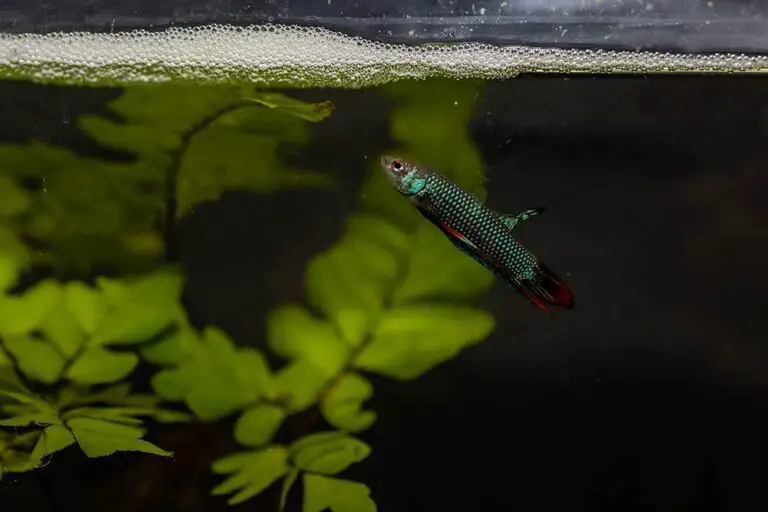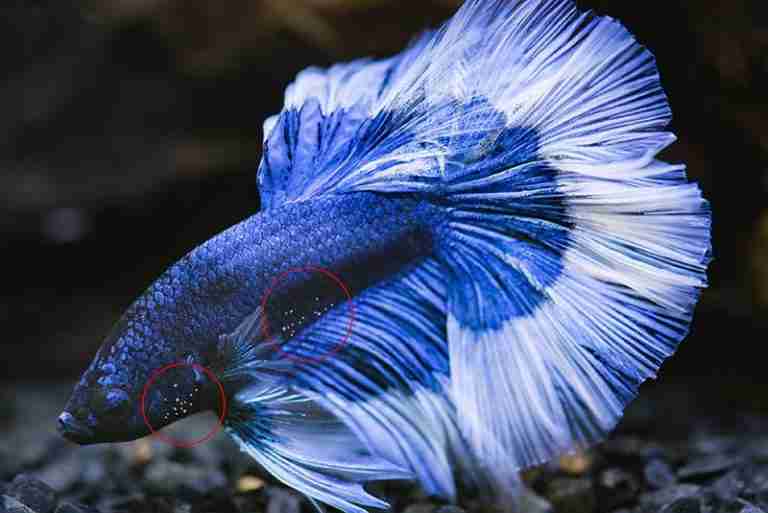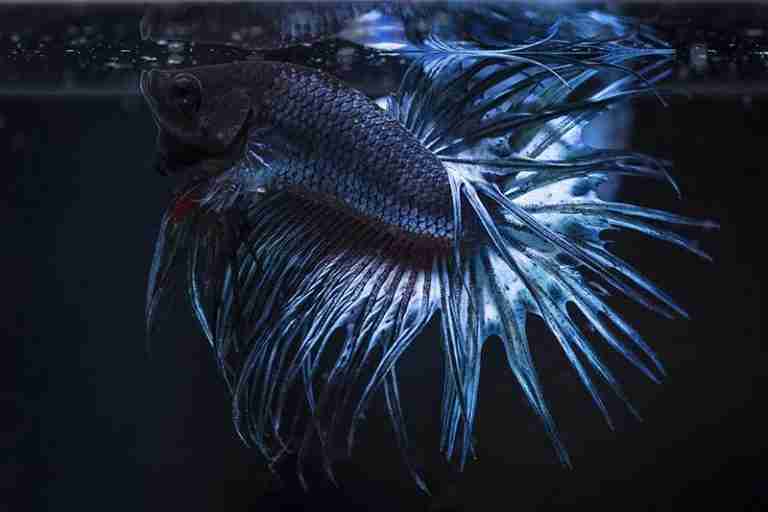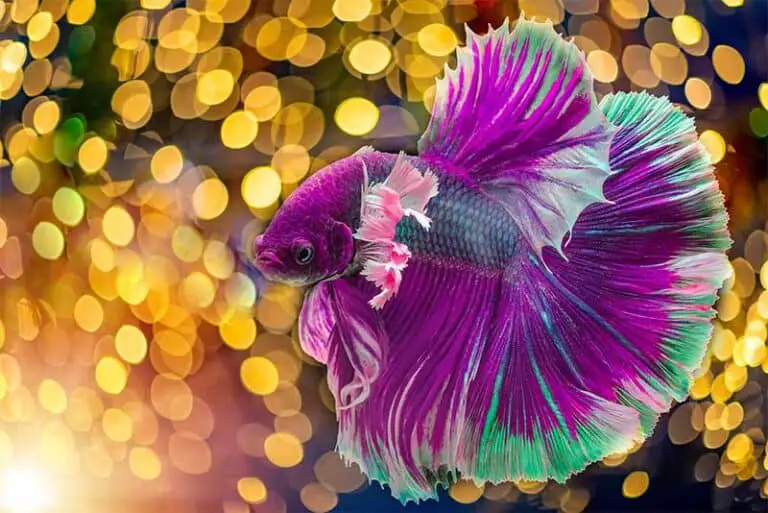Bloated Betta Fish (Easy fixes and prevention guide)
Do you have a bloated betta fish? Don’t worry, it’s common, and several possible causes exist. Bloating is typically a symptom of poor digestion, often caused by a poor diet which is easy to treat.
In this blog post, I’ll explain some of the most common reasons for a bloated betta fish and what you can do to help them feel better. Keep reading to learn more!
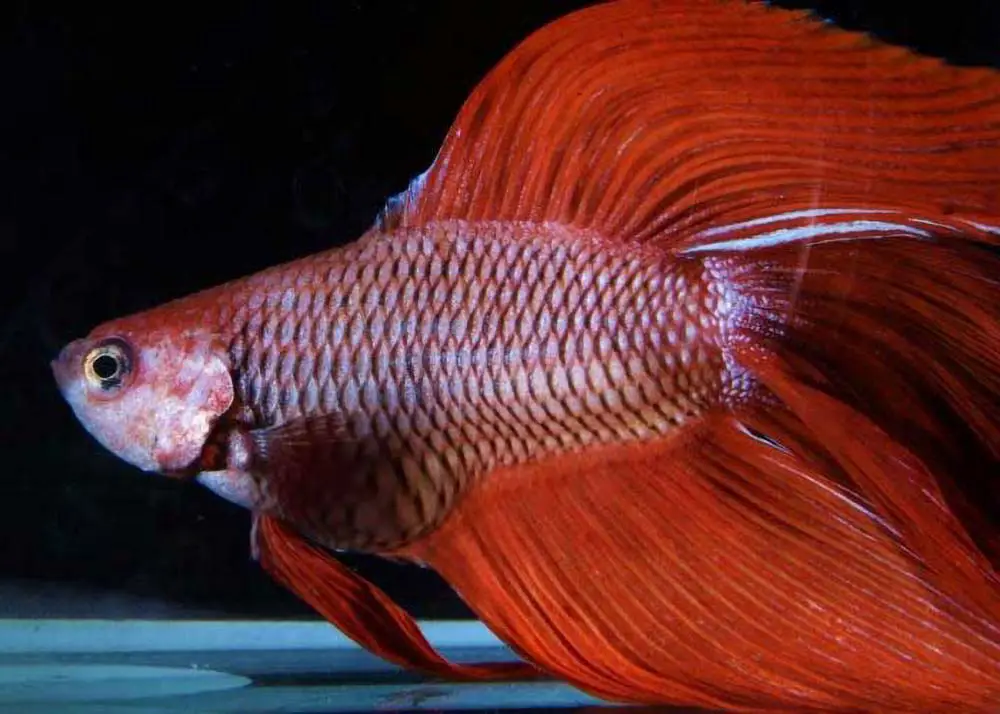
What Is Bloating In Betta Fish
It’s not just humans who can become bloated, betta fish can too! Betta fish bloating is a common condition appearing as swelling to their midsection.
There are several potential causes for bloat in betta fish, and there are many easy fixes, so don’t panic!
Bloated Betta Fish Symptoms
The most apparent symptom of bloating in betta fish is swelling which can appear as a large or small mass. Bloating usually causes related symptoms such as difficulty swimming, lack of buoyancy, loss of appetite, and lethargy.
These symptoms often indicate a gastrointestinal issue, but other illnesses may present differently.
If you have a betta fish that appears bloated, it’s essential to take the time to investigate the root cause so you can pursue appropriate treatment. A poor or rushed diagnosis can leave the underlying cause to worsen.
Fortunately, most cases of bloat are easily fixed with dietary changes and, if needed, antibiotics prescribed by a veterinarian.
What Causes Bloating In Betta Fish
Betta fish can suffer from bloating for a variety of reasons. The most common causes are:
- Poor Diet
- Constipation.
- Poor water quality.
- Swim bladder disease.
- Egg Producing.
- Malawi bloat.
- Dropsy.
- Bacterial or fungal infections.
- Parasites.
Although some of the reasons I have listed are severe, bloating is mainly caused by a poor diet, leading to constipation, which is the easiest to treat.
Below, I will explain why each of these can cause your betta to look full and bloated, and then we can look at the most common treatments.
Poor Diet
Betta fish need a varied diet for the best health, including live food and betta pellets or flakes. Adding vegetables or plant matter, such as algae wafers, can also provide fiber to aid digestion.
One of the most common mistakes I see people make is feeding betta fish too much dry food. The problem with dry food such as pellets is they can swell up when absorbing fluid. If you feed your betta fish too many pellets, they will swell inside the stomach, causing it to look bloated.
Another problem with feeding too much dry food is that there won’t be enough fluid inside your betta’s stomach, so its consistency will remain dry and struggle to pass through the intestine.
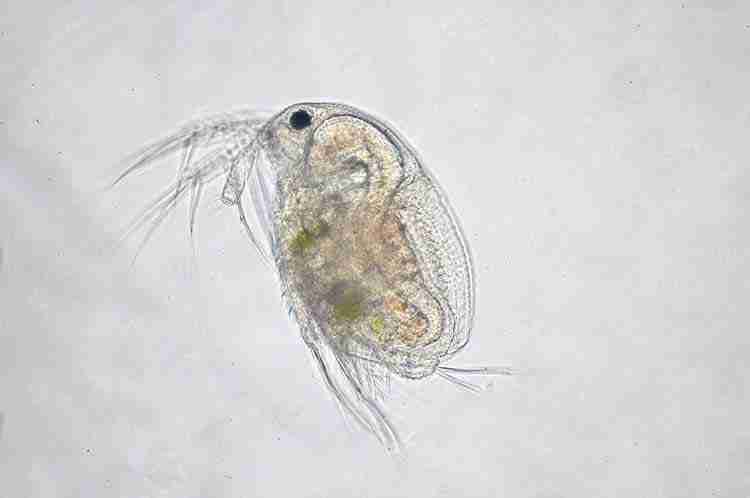
Regular feeding in this way will quickly lead to a blockage, and you may find your betta regurgitating food that won’t fit, or your betta may stop eating altogether.
The best solution is to soak pellets and other dry food first until it expands and provide some live (or frozen) food, such as brine shrimp or daphnia. Daphnia is an excellent source of fiber.
Constipation
In my experience, constipation is undoubtedly the leading cause of bloating in betta fish. If you have a betta fish with a bloated stomach, it is probably due to a poor diet or a slow digestive system creating a blockage.
I discussed a poor diet in the previous section, but a slow or sluggish digestive system can also cause food to block the gastrointestinal tract.
If you don’t feel that your bettas have a poor diet or impaired digestion, a tumor may be the cause. Betta fish sometimes develop tumors within the digestive tract, making it more difficult for food to pass and increasing the likelihood of constipation.
The easiest way to tell if your betta is constipated is to check how frequently they pass a stool and its consistency. Betta poop should be soft, long, and light brown. Small, dark poop balls or watery, stringy poop indicates constipation or another digestive issue.
I have written a separate article specifically about betta constipation as it is so common.
Poor Water Quality
Poor water quality can cause many health problems in betta fish, including bloating. Bettas are very sensitive to their environment, so sudden changes to temperature, pH level, oxygen level, or the cleanliness of the water can cause a reaction.
Low temperatures can cause a betta’s metabolism to slow, which will cause its digestive system to become sluggish. Your betta will become full much quicker, and food will sit in its stomach or intestine for longer, causing gasses to build up and making your betta fish look swollen.
A waste build-up in your betta’s tank will not only allow bacteria and parasites to thrive, but it can also become toxic, leading to spikes in ammonia and nitrites. Sudden changes in water chemistry can cause a shock reaction in many fish, leading to health and digestive problems.
It’s easy to check your aquarium’s water parameters, which you should do regularly, but if you find the parameters are out, assume it’s not the cause of the bloat, as you may overlook other issues. Fix the water parameters and look for any further issues.
Swim Bladder Disease
Swim bladder disease is another common problem found in betta fish. The swim bladder is a buoyance aid that helps keep fish upright and allows them to ascend, descend, or remain stationary in the water, dependent on how much air it contains.
Betta fish will instinctively inflate or deflate their swim bladder as they swim around their tank.
It’s easy to diagnose swim bladder disease by watching your betta swimming. If you see your betta fish struggling to stay upright, floating upside down, on their side, or bumping into things, it is likely an impaired swim bladder.
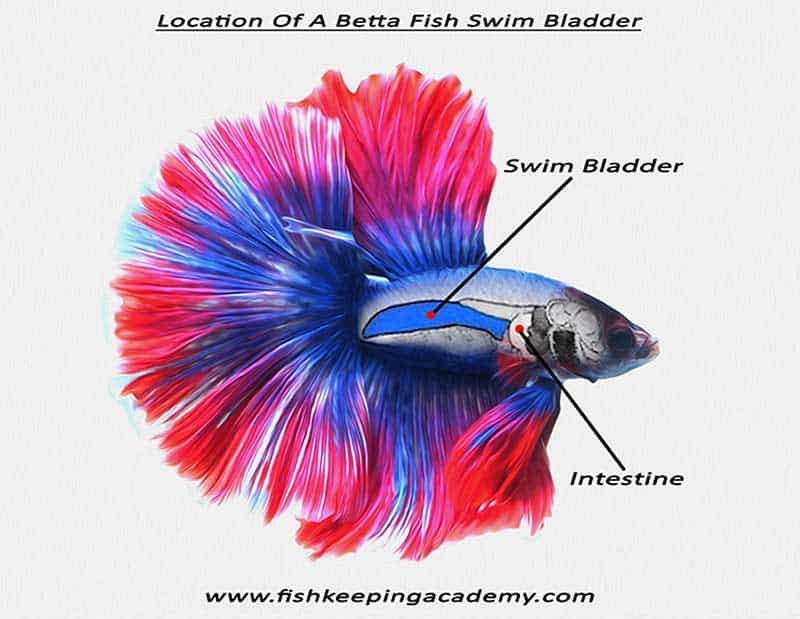
Swim bladder disease is typically a symptom of an underlying condition that you must diagnose and treat.
One common cause of swim bladder disease is constipation. A swim bladder can cause bloating when it becomes too full of air and won’t deflate.
A swollen stomach or intestine can press against the swim bladder, causing it to malfunction. Your betta is more likely to be stuck at the top of the tank, floating around with the current.
If you feel that your betta has swim bladder disease, please read my article: Swim Bladder Disease In Bettas (A complete treatment guide), which will tell you everything you need to know to fix the problem.
Egg Producing
As they are not livebearers, female betta fish will produce eggs they release for a male betta fish to fertilize.
Bloating in female betta fish is often caused when they are full of eggs, often referred to as pregnant.
Bloating from eggs looks slightly different from digestive issues as the bulge is located further down the abdomen.
Once a female betta has released her eggs, the bloating will subside.
Malawi Bloat
Malawi bloat can cause swelling, decreased appetite, and spending more time at the surface of the water as it struggles to breathe.
Another symptom of Malawi bloat includes an enlarged and protruding belly, which can affect both sides of the betta or just one side.
Malawi bloat is a rare disease caused by bacteria or a parasite, and it is more commonly seen in African cichlids than in betta fish.
Treatment for Malawi bloat includes metronidazole-dosed foods or doses of up to 50 mg per liter in aquarium water.
The best way to avoid contracting Malawi bloat is to keep your tank clean and well-maintained.
Dropsy
Dropsy, also known as Bloat or Dropsy Syndrome, is a condition common in betta fish. It is an infectious and often fatal disease that results in fluid build-up in the abdomen and organs, eventually leading to organ failure.
Symptoms of dropsy include bloating, loss of appetite, listlessness, color change, clamped fins, and sunken eyes.
Dropsy in betta fish is often fatal, so treatment should begin as soon as possible after diagnosis to reduce the severity of symptoms and increase survival chances.
Treatment generally consists of antibiotics for bacterial infection, dietary adjustments, and water parameter changes.
Bacterial Or Fungal Infection
Another cause of bloating, although much less common, are bacterial and fungal infections. Both can cause general poor health and symptoms such as inflammation and bloat.
Bacteria is always present in aquariums, and fish rarely become ill until the level of bacteria reaches an unacceptable level or if your betta’s immune system has become impaired. Fungal infections are also more common when betta fish have impaired immunity.
Once infection occurs in the digestive tract, inflammation can occur, causing your betta to look bloated and slowing the passage of food, increasing the appearance of bloat.
If your betta’s bloating is caused by a bacterial or fungal infection, it will usually display other symptoms, such as:
- Lethargy.
- Decreased appetite.
- Hiding.
- Discoloration of scales.
Many treatments are available online or in pet stores, or you can ask a veterinarian for advice.
Parasites
The final cause of bloating I will talk about is parasites. Many different parasites affect betta fish, the most common I have listed below.
Parasites can get into an aquarium through a variety of mediums such as new plants, live foods, substrate, or new tank mates can bring them in.
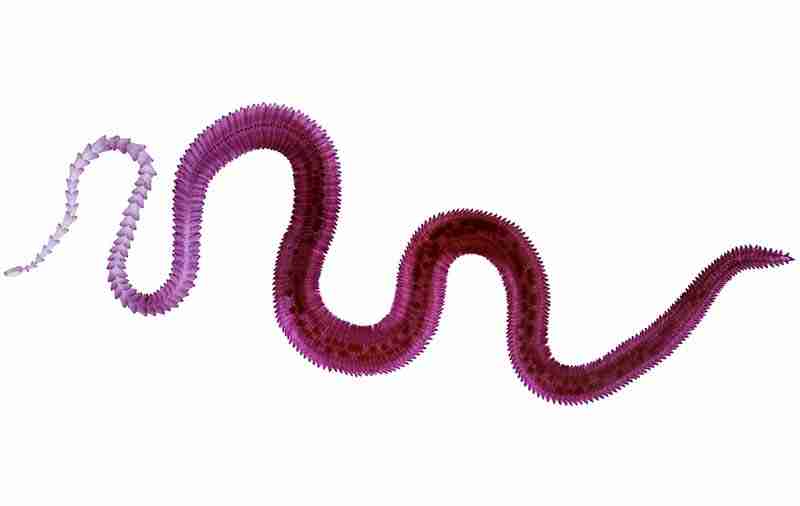
It’s best to always sanitize or quarantine new additions to an aquarium to minimize the risk of introducing parasites and bacteria. When unnoticed, parasites can severely harm the health of your betta as they burrow and feed on flesh and organs, eating your betta fish alive.
Parasites from live foods enter the digestive system, and you won’t know they are there. Parasites will cause damage, resulting in inflammation of the stomach and intestines, and your betta will also not gain the necessary nutrients from their food.
Parasites multiply quickly in favorable conditions, so you may notice them protruding from your betta’s poop or boring a hole through your betta’s stomach, leading to death.
There are several treatments for aquarium parasites. If your betta generally looks unwell and loses weight while still showing a bloated belly, you should consider parasites as a potential cause. They may also rub against rocks and substrate, known as flashing, to try and detach parasites.
Act fast when treating parasites to minimize the potential damage.
How To Treat A Bloated Betta Fish
Fortunately, most cases of bloat in betta fish are easily treated, especially if you can identify the cause.
Dietary issues are the most common cause of bloat, so if your betta fish is fed too much or with nutrient-deficient food, offering them a higher quality diet with pre-soaked pellets and frozen or live protein sources can help.
If the water quality is to blame, you’ll need to test the parameters and make necessary adjustments, such as doing frequent partial water changes and removing decaying matter from the tank.
The best way to deal with constipation is to feed live daphnia to your betta fish, which provides fiber to ease the blockage. I also recommend a blanched pea, cooked until very soft and squashed down.
If neither of these works, don’t feed your betta for a few days, and blocked waste should break down enough to clear itself.
Lastly, parasites or diseases like dropsy could be the culprit, so using the correct medications, precisely formulated, will be necessary.
I found this useful video on Youtube from Everyday Aquatics on how to treat bloating in betta fish.
How To Prevent Bloating In Betta Fish
It is much better to prevent betta fish bloating than to treat it, but it does require some extra attention. So what should you do to avoid bloating in your betta?
Fasting
Fasting is one of the best ways to protect your betta’s digestive system. You fast your betta fish by choosing one or two days where you withhold food. I fast all of my tropical fish for two days out of every week.
A betta fish living in a home aquarium is often fed far more than necessary and expends very little energy. Fasting is an excellent way for the digestive system to clear and relax.
If you fast your betta for two days a week, you can choose consecutive days or several days apart. I always fast my fish on weekends (Saturday and Sunday).
Nutritious Varied Diet
Providing a nutritious and varied diet is another good way to prevent bloat. Ideally, feed your betta fish a high-quality betta pellet on alternate days to live foods such as daphnia, brine shrimp, bloodworms, or mysis shrimp.
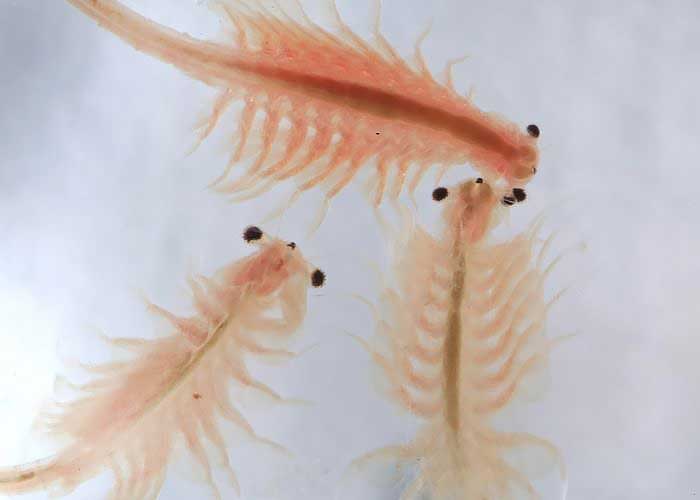
Tank Checks And Maintenance
You should keep your tank clean and regularly check water parameters to keep your betta fish in good health.
From time to time, your betta fish may get sick through no fault of your own, but the more effort you put in to prevent bloating, the more chance you will have of succeeding.
Check out our betta fish care guide for general information.
Conclusion
As you can see, several factors can cause a bloated betta fish, although the most likely cause is digestive issues, so I have suggested some effective remedies.
If you have a bloated betta fish, it can be a symptom of a more severe illness, so it’s essential to thoroughly evaluate before deciding on a course of treatment. Conditions such as parasites or dropsy can be fatal is not treated quickly.
Prevention is the best course of action, and fasting is one of the most popular methods to keep your bettas digestive system in good shape.
I hope this article has helped you and your betta’s bloating issue.


